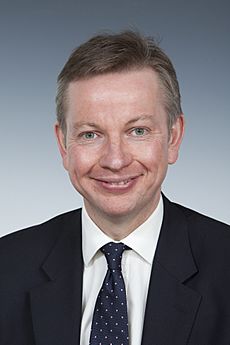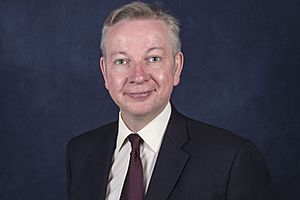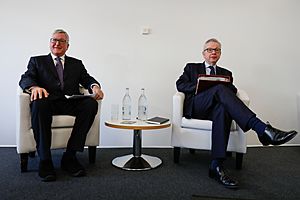Michael Gove facts for kids
Quick facts for kids
The Lord Gove
|
|||||||||||||||||||||||||
|---|---|---|---|---|---|---|---|---|---|---|---|---|---|---|---|---|---|---|---|---|---|---|---|---|---|
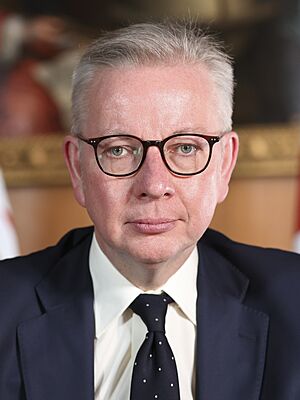
Official portrait, 2021
|
|||||||||||||||||||||||||
| Secretary of State for Levelling Up, Housing and Communities | |||||||||||||||||||||||||
| In office 25 October 2022 – 5 July 2024 |
|||||||||||||||||||||||||
| Prime Minister | Rishi Sunak | ||||||||||||||||||||||||
| Preceded by | Simon Clarke | ||||||||||||||||||||||||
| Succeeded by | Angela Rayner | ||||||||||||||||||||||||
| In office 15 September 2021 – 6 July 2022 |
|||||||||||||||||||||||||
| Prime Minister | Boris Johnson | ||||||||||||||||||||||||
| Preceded by | Robert Jenrick | ||||||||||||||||||||||||
| Succeeded by | Greg Clark | ||||||||||||||||||||||||
| Minister for Intergovernmental Relations | |||||||||||||||||||||||||
| In office 25 October 2022 – 5 July 2024 |
|||||||||||||||||||||||||
| Prime Minister | Rishi Sunak | ||||||||||||||||||||||||
| Preceded by | Nadhim Zahawi | ||||||||||||||||||||||||
| Succeeded by | Pat McFadden | ||||||||||||||||||||||||
| In office 18 September 2021 – 6 July 2022 |
|||||||||||||||||||||||||
| Prime Minister | Boris Johnson | ||||||||||||||||||||||||
| Preceded by | Office established | ||||||||||||||||||||||||
| Succeeded by | Nadhim Zahawi | ||||||||||||||||||||||||
| Chancellor of the Duchy of Lancaster | |||||||||||||||||||||||||
| In office 24 July 2019 – 15 September 2021 |
|||||||||||||||||||||||||
| Prime Minister | Boris Johnson | ||||||||||||||||||||||||
| Preceded by | David Lidington | ||||||||||||||||||||||||
| Succeeded by | Steve Barclay | ||||||||||||||||||||||||
| Minister for the Cabinet Office | |||||||||||||||||||||||||
| In office 13 February 2020 – 15 September 2021 |
|||||||||||||||||||||||||
| Prime Minister | Boris Johnson | ||||||||||||||||||||||||
| Preceded by | Oliver Dowden | ||||||||||||||||||||||||
| Succeeded by | Steve Barclay | ||||||||||||||||||||||||
| Secretary of State for Environment, Food and Rural Affairs | |||||||||||||||||||||||||
| In office 11 June 2017 – 24 July 2019 |
|||||||||||||||||||||||||
| Prime Minister | Theresa May | ||||||||||||||||||||||||
| Preceded by | Andrea Leadsom | ||||||||||||||||||||||||
| Succeeded by | Theresa Villiers | ||||||||||||||||||||||||
| Secretary of State for Justice Lord Chancellor |
|||||||||||||||||||||||||
| In office 9 May 2015 – 14 July 2016 |
|||||||||||||||||||||||||
| Prime Minister | David Cameron | ||||||||||||||||||||||||
| Preceded by | Chris Grayling | ||||||||||||||||||||||||
| Succeeded by | Liz Truss | ||||||||||||||||||||||||
| Chief Whip of the House of Commons Parliamentary Secretary to the Treasury |
|||||||||||||||||||||||||
| In office 15 July 2014 – 9 May 2015 |
|||||||||||||||||||||||||
| Prime Minister | David Cameron | ||||||||||||||||||||||||
| Preceded by | George Young | ||||||||||||||||||||||||
| Succeeded by | Mark Harper | ||||||||||||||||||||||||
| Secretary of State for Education | |||||||||||||||||||||||||
| In office 12 May 2010 – 15 July 2014 |
|||||||||||||||||||||||||
| Prime Minister | David Cameron | ||||||||||||||||||||||||
| Preceded by | Ed Balls | ||||||||||||||||||||||||
| Succeeded by | Nicky Morgan | ||||||||||||||||||||||||
|
|||||||||||||||||||||||||
|
|||||||||||||||||||||||||
| Personal details | |||||||||||||||||||||||||
| Born |
Graeme Andrew Logan
26 August 1967 Aberdeen, Scotland |
||||||||||||||||||||||||
| Political party | Conservative | ||||||||||||||||||||||||
| Other political affiliations |
Labour (1983) | ||||||||||||||||||||||||
| Spouse |
Sarah Vine
(m. 2001; div. 2022) |
||||||||||||||||||||||||
| Children | 2 | ||||||||||||||||||||||||
| Education | Robert Gordon's College | ||||||||||||||||||||||||
| Alma mater | Lady Margaret Hall, Oxford (BA) | ||||||||||||||||||||||||
| Occupation |
|
||||||||||||||||||||||||
| Signature | |||||||||||||||||||||||||
Michael Gove (born Graeme Andrew Logan, 26 August 1967) is a British politician and journalist. He has held many important jobs in the UK government under different Prime Ministers. These include David Cameron, Theresa May, Boris Johnson, and Rishi Sunak.
He was a Member of Parliament (MP) for Surrey Heath from 2005 to 2024. He is a member of the Conservative Party. In 2025, he became a life peer in the House of Lords, known as Baron Gove. He has also been the editor of The Spectator magazine since October 2024.
Contents
- Early Life and Education
- Early Career as a Journalist
- Political Career
- Becoming a Member of Parliament: 2005–2010
- Secretary of State for Education: 2010–2014
- Chief Whip: 2014–2015
- Secretary of State for Justice: 2015–2016
- Out of Government: 2016–2017
- Secretary of State for Environment, Food and Rural Affairs: 2017–2019
- Chancellor of the Duchy of Lancaster: 2019–2021
- Secretary of State for Levelling Up, Housing and Communities: 2021–2022
- Return to Government: 2022–2024
- Retirement from Parliament and New Role
- Joining the House of Lords
- Political Views
- Personal Life
- Honours
- See also
Early Life and Education
Michael Gove was born Graeme Andrew Logan on 26 August 1967 in Aberdeen, Scotland. He was adopted when he was four months old by Ernest and Christine Gove. They changed his name to Michael Andrew Gove. His adoptive father worked in a fish processing business, and his adoptive mother was a lab assistant.
He grew up in Aberdeen and went to Sunnybank Primary School and Kittybrewster Primary School. Later, he attended Robert Gordon's College, an independent school. When he was a teenager, he joined the Labour Party for a short time.
Studying at Oxford
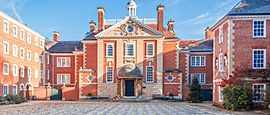
In 1985, Gove went to Lady Margaret Hall, Oxford University to study English. While there, he joined the Conservative Party. He was involved in student politics and even became President of the Oxford Union, a famous debating society. He graduated with a good degree in English.
Early Career as a Journalist
After university, Michael Gove started a career in journalism. He worked for The Press and Journal in Aberdeen. He also worked for Scottish Television and the BBC.
In 1996, he joined The Times newspaper. He wrote articles and became an editor there. He wrote about politics and current events for the paper until 2005. He also wrote books, including a study of the Northern Ireland peace process. Gove also helped start Policy Exchange, a conservative research group.
Political Career
Becoming a Member of Parliament: 2005–2010
Michael Gove was elected as the Member of Parliament for Surrey Heath in the 2005 general election. He won by a large number of votes.
As an MP, he became the Shadow Minister for Housing and Planning. This meant he was part of the opposition party, looking at the government's plans for housing. He also wrote columns for different magazines and newspapers.
In 2007, he was promoted to Shadow Secretary of State for Children, Schools and Families. In this role, he suggested new ideas for education, like allowing parents to choose schools that would be funded by the state.
Secretary of State for Education: 2010–2014
After the 2010 general election, Michael Gove became the Secretary of State for Education. This was a very important job where he was in charge of schools and education across England.
He made many changes to the education system. He allowed more schools to become academies, which have more freedom from local councils. He also changed the national curriculum, bringing back more traditional authors and strengthening subjects like maths and science. These changes aimed to improve children's reading, writing, and maths skills.
Some teachers' unions disagreed with his changes. They felt his policies were not always helpful for schools and teachers.
Chief Whip: 2014–2015
In 2014, Gove was moved to a new role as the Government Chief Whip. The Chief Whip's job is to make sure that members of their political party vote in Parliament the way the party wants them to. This role is very important for keeping party discipline.
Secretary of State for Justice: 2015–2016
After the 2015 general election, Gove became the Secretary of State for Justice and Lord Chancellor. In this role, he was in charge of the justice system, including courts and prisons.
He made some changes, like removing a limit on the number of books prisoners could have. He believed that books could help prisoners improve their reading and maths skills. He also stopped a plan for a prison contract in Saudi Arabia.
EU Referendum Role
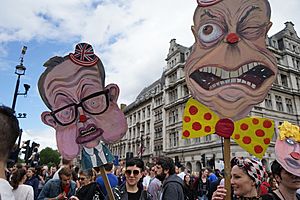
Michael Gove was a very important figure in the campaign for Britain to leave the European Union in the 2016 referendum. He argued that Britain would be "freer, fairer and better off" outside the EU. He was a co-leader of the "Vote Leave" campaign.
Conservative Party Leadership Contest 2016
After the referendum, the Prime Minister, David Cameron, resigned. Michael Gove decided to run to become the leader of the Conservative Party. He finished in third place in the contest, which was eventually won by Theresa May.
Out of Government: 2016–2017
After Theresa May became Prime Minister, Michael Gove was not initially given a job in her government. During this time, he continued to be an MP and wrote columns for The Times newspaper. He also interviewed Donald Trump in January 2017, before Trump became President of the United States.
Secretary of State for Environment, Food and Rural Affairs: 2017–2019
In 2017, Gove was appointed Secretary of State for Environment, Food and Rural Affairs. In this role, he focused on protecting the environment.
He introduced a ban on tiny plastic beads called microbeads, which are found in some cosmetics and can harm marine life. He also announced plans for a ban on new petrol and diesel cars by 2040 to help reduce air pollution. Gove also worked to ban certain pesticides that harm bees and introduced stricter laws for animal welfare.
Conservative Party Leadership Contest 2019
In 2019, Theresa May resigned as Prime Minister. Michael Gove ran again for the leadership of the Conservative Party. He finished third in this contest as well, which was won by Boris Johnson.
Chancellor of the Duchy of Lancaster: 2019–2021
When Boris Johnson became Prime Minister, Michael Gove was appointed Chancellor of the Duchy of Lancaster. This is a senior role in the government, where he helped prepare for Britain's exit from the European Union. He also became Minister for the Cabinet Office in 2020.
During the COVID-19 pandemic, Gove was involved in coordinating the government's response. He chaired meetings and helped make decisions about rules for social mixing.
Secretary of State for Levelling Up, Housing and Communities: 2021–2022
In September 2021, Gove became the Secretary of State for Levelling Up, Housing and Communities. This new department was created to focus on the government's "levelling up" plan, which aims to reduce differences between different parts of the UK. He was also given the title of Minister for Intergovernmental Relations.
In this role, he launched a plan to increase public investment and give more power to local areas across the UK. He also announced the "Homes for Ukraine" scheme, which helped British households offer homes to Ukrainian refugees. In July 2022, he was dismissed from this role.
Return to Government: 2022–2024
In October 2022, when Rishi Sunak became Prime Minister, Michael Gove was reappointed to his previous roles as Secretary of State for Levelling Up, Housing and Communities and Minister for Intergovernmental Relations.
In February 2023, he announced "Awaab's Law", which requires social housing providers to fix damp and mould problems quickly. This law was named after a two-year-old child who died due to mould in his home.
Retirement from Parliament and New Role
Michael Gove did not stand for re-election in the 2024 general election. His time as an MP ended in May 2024.
In October 2024, he became the editor of The Spectator magazine. He also presented a radio series for BBC Radio 4 about politics.
Joining the House of Lords
In May 2025, Michael Gove was made a life peer, which means he became a member of the House of Lords. His title is Baron Gove, named after Torry in Aberdeen, where his adoptive father was born. He was officially introduced to the House of Lords later that month.
Political Views
Michael Gove is generally seen as a Conservative politician who believes in economic freedom and less government interference in daily life. He has also expressed strong support for Israel.
He has spoken about the importance of tackling inequality and improving public services. He believes in the value and dignity of every person.
Personal Life
Michael Gove married journalist Sarah Vine in 2001. They have two children. In 2021, they announced their separation, and their divorce was finalised in 2022.
He has lived in several areas of London. After becoming a Secretary of State again in 2021, he lived in a government-provided flat in London.
Gove was baptised in the Church of Scotland. His adoptive father, Ernest Gove, passed away in 2023.
Honours
 Life Peerage, Baron Gove, of Torry in the City of Aberdeen (2025)
Life Peerage, Baron Gove, of Torry in the City of Aberdeen (2025)
See also
 In Spanish: Michael Gove para niños
In Spanish: Michael Gove para niños
 | Valerie Thomas |
 | Frederick McKinley Jones |
 | George Edward Alcorn Jr. |
 | Thomas Mensah |


